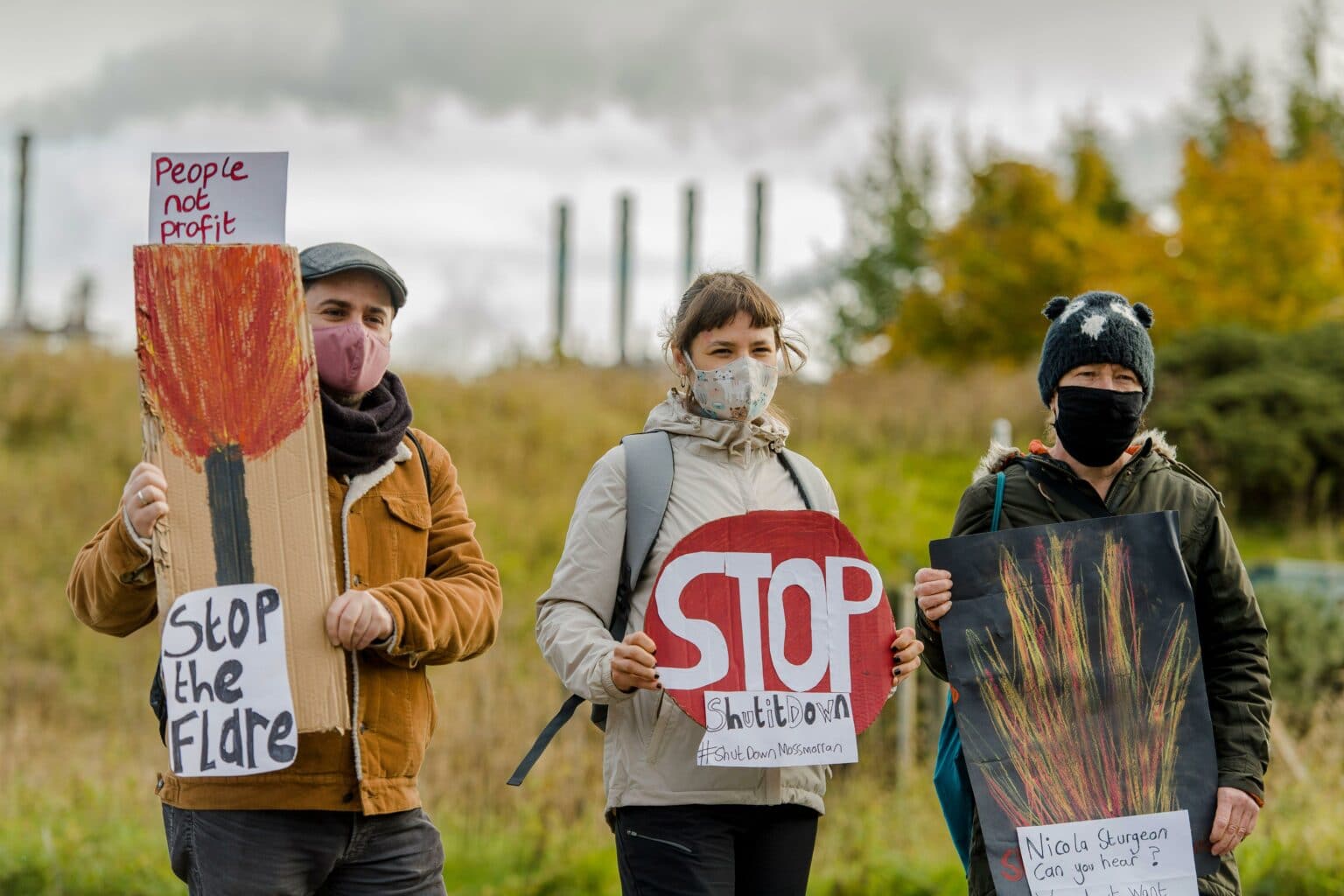Scottish climate activists are preparing to protest this weekend at the Mossmorran petrochemical complex, the country’s third largest carbon emitter, in what they say will be Scotland’s first “Climate Camp” since 2009.
The two-day camp in Fife follows years of community campaigns against flaring and pollution at the plants, which are operated by oil giants ExxonMobil and Shell. The plants released a combined 930,000 tonnes of carbon dioxide in 2019, according to the Scottish Environment Protection Agency (SEPA).
Climate Camp Scotland are calling for the government to shut down the plant and begin a “Just Transition” to create green jobs for workers in the fossil fuel industry.
Spokesperson Benji Brown said: “We believe that the time is right for transitioning to a different type of economy which prioritises people’s health and wellbeing over corporate profits, which is what Shell and Exxon care about most.”
“We’re calling for the establishment of a Just Transition Board, which would have representation from both workers and communities to establish a plan for moving the regional economy away from reliance on oil and gas,” he said.
Shell and ExxonMobil have breached environmental regulations a number of times at the site. In 2019, ExxonMobil was accused of covering up two explosions at Mossmorran by saying that two of the three boilers at the plant had failed.
Exxon has come under fire in recent weeks after one of its lobbyists was secretly recorded explaining how the company had successfully obstructed climate action for decades, while Shell was recently ordered by a Dutch court to cut its emissions by 45 percent by 2030, a decision it is appealing.
Residents protested at the plant gates weekly last year in the run up to Christmas, following a three-day emergency flaring event in October. This refers to the practice of burning large amounts of excess gas to keep the plant running safely, releasing C02 and causing noise and light pollution. The flares can be seen as far away as Edinburgh.
Jemma Kettlewell from local campaign group Actions Speak Louder Than Words (ASLTW) said: “For communities living next to Mossmorran, the constant flaring is terrifying. It impacts our mental and physical health.”
“Residents have reported heightened anxiety, health impacts including itchy throats, asthma, headaches and migraines, and sleepless nights from light and noise pollution,” she added.
‘Your House Vibrates’
Mossmorran Action Group, a residents group, has been mapping the plants’ impacts on the surrounding community since 2017.
Spokesperson James Glen said that emergency flaring was “frequent” at Exxon’s Ethylene Plant, with events lasting from one day to three weeks.
Glen said: “This creates a large flame that can be 40 to 100 feet into the air, and it creates a very loud rumble in people’s homes.”
“There’s excessive noise pollution. Your house vibrates, your body vibrates, and it disturbs sleep and upsets children and people with sensory issues.”
“We’ve got a right to live in our communities safely and not be fearful of that plant exploding,” he said.
Exxon plans to install an Enclosed Ground Flare to replace the Elevated Flare currently in use, which it says will be smokeless, quieter and invisible on clear days and night. But Climate Camp Scotland’s Benji Brown said this was not an “adequate response” because “it’s not just about the visual impact; it’s about the global climate crisis that is impacting everyone.”
An ExxonMobil spokesperson said: “ExxonMobil believes that climate change risks warrant action and it’s going to take all of us — business, governments and consumers — to make meaningful progress.
“Independent analysis stretching back over three decades from SEPA and Fife Council concludes that there are no local air quality issues associated with operations at Mossmorran.
“We are committed to making our operations much quieter and less visible through significant investment at Fife Ethylene Plant (FEP), including a £140m plant upgrade, a 14-step flaring reduction plan and an investment in an Enclosed Ground Flare, which alone will reduce elevated flaring by at least 98%.”
A Shell spokesperson said: “We respect the right of everyone to express their point of view, we only ask that they do so with their safety and the safety of others in mind.
“We agree that society needs to take urgent action on climate change. We fully support the UK government’s target of net-zero emissions by 2050 and are committed to playing our part, by addressing our own emissions and helping customers to reduce theirs.
“What will really accelerate change is effective policy, investment in technology innovation and deployment, and changes in customer behaviour.’’
Mossmorran Action Weekend from 31 July to 1 August will include workshops, assemblies and performances on Saturday 31 July, and a demonstration at the site’s gates on Sunday. According to organisers, strict Covid-19 precautions will be in place during the event.
Subscribe to our newsletter
Stay up to date with DeSmog news and alerts







